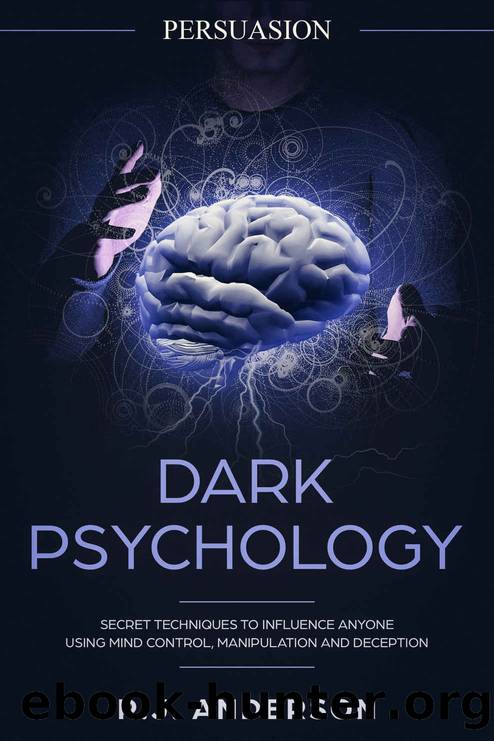Persuasion: Dark Psychology - Secret Techniques To Influence Anyone Using Mind Control, Manipulation And Deception (Persuasion, Influence, NLP) (Dark Psychology Series Book 1) by R.J. Anderson

Author:R.J. Anderson [Anderson, R.J.]
Language: eng
Format: azw3
Published: 2018-03-25T16:00:00+00:00
Top NLP Techniques of Persuasive People
All of the techniques that will be discussed here come from an NLP perspective and that is why they are so effective. These include:
Embedded commands: When you make it impossible to say “no” while remaining polite, you can convince people to do what you want every time. For example, do not ask a person if they want to go to dinner. Ask them where they want to go. With the first question, they can say “no,” but with the second, they feel like you are wanting their opinion, so they feel compelled to have dinner with you.
Choice restriction: You want to restrict choice without it being obvious that you are doing so. For example, instead of asking a person the type of wine they would like, ask them “red or white?”. The second question will restrict them to either white or red. Then, you will ultimately get to choose the wine based on the color that they chose. They will not realize that you essentially persuaded them to allow you to choose which wine the two of you are going to drink.
I could, but rather not: This is a technique you have certainly used in the past and it has likely been used on you. An example would be saying something, such as “I can drive if you want me to.” At this point, you are saying you can drive, but the last part of the sentence opens the door for the other person to volunteer because you really do not want to drive. In most cases, the other person will volunteer to drive not even realizing that you wanted that exact outcome.
And vs. but: You have no idea how powerful “but” can be until you are starting to enhance your persuasion skills. This word can easily change opinions and you can fully use this to your advantage. For example, if you want someone to take you somewhere, but they are tired, you could frame it in the following way: “I know you are tired but going to this movie will be so much fun and everyone has seen it.” The second part of the sentence after the “but” makes them feel obligated since the movie is trendy and fun.
What they really want: This is not only a type of NLP persuasion technique, but also a form of hypnotism. Make sure that when you ask what a person wants that you make it open. For example, ask which car they would want if money was not a factor. You can use this same approach for just about anything. Once you get their true needs and wants, you can use these to your advantage to persuade the other person to do something. For example, if you want to take a vacation with your significant other, ask where they would go if there were no restrictions. Once they answer, use this to present your idea.
Download
This site does not store any files on its server. We only index and link to content provided by other sites. Please contact the content providers to delete copyright contents if any and email us, we'll remove relevant links or contents immediately.
Hit Refresh by Satya Nadella(9138)
The Compound Effect by Darren Hardy(8972)
Change Your Questions, Change Your Life by Marilee Adams(7786)
Nudge - Improving Decisions about Health, Wealth, and Happiness by Thaler Sunstein(7710)
The Black Swan by Nassim Nicholas Taleb(7134)
Deep Work by Cal Newport(7087)
Rich Dad Poor Dad by Robert T. Kiyosaki(6639)
Daring Greatly by Brene Brown(6515)
Principles: Life and Work by Ray Dalio(6455)
Playing to Win_ How Strategy Really Works by A.G. Lafley & Roger L. Martin(6313)
Man-made Catastrophes and Risk Information Concealment by Dmitry Chernov & Didier Sornette(6022)
Big Magic: Creative Living Beyond Fear by Elizabeth Gilbert(5777)
Digital Minimalism by Cal Newport;(5765)
The Myth of the Strong Leader by Archie Brown(5510)
The Slight Edge by Jeff Olson(5419)
Discipline Equals Freedom by Jocko Willink(5390)
The Motivation Myth by Jeff Haden(5213)
The Laws of Human Nature by Robert Greene(5211)
Stone's Rules by Roger Stone(5088)
